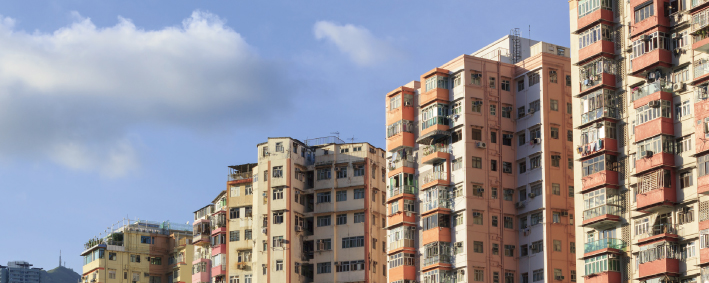 |
CCCH9033 China: Culture, State and Society
|
Course Description
The Sustainable Development Goals (SDGs) were set up by the United Nations in 2015 to “achieve a better and more sustainable future for all.” In response to the SDGs, this course explores how Hong Kong responds and reacts to various issues related to sustainable urban living. As a global city with unique cultural, historical, economic and political setups, sustainability is a pressing concern and holds the key to the long-term urban development of Hong Kong. The emphasis of the course is on understanding sustainable urban development in the context of a high-density, market-oriented Asian world city.
Urban sustainability is more than an environmental concept: It also includes the ethical utilization of resources, geographical equity, both inter- and intra-generational equity; as well as touching upon such social, economic and political issues, accommodating multi-cultural and diversified aspirations, ensuring public engagement and nurturing public participation and partnership in the development process. The course offers a regional and comparative perspective to the understanding of the challenges that Hong Kong faces in maintaining her competitive role in the Greater Bay Area and the world.

Course Learning Outcomes
On completing the course, students will be able to:
- Explain urban sustainability challenges at the global level and examine responses in Hong Kong.
- Use various sources of information to assess Hong Kong’s performance in terms of tackling various global issues.
- Apply knowledge generated in the cases of Hong Kong to understand and examine sustainable urban development issues in Chinese cities.
- Demonstrate a reflective response to global sustainability challenges in the context of Hong Kong and an awareness of the implications of such responses on the challenges China is facing in post-Covid-19 era.
Offer Semester and Day of Teaching
First semester (Wed)
Study Load
| Activities | Number of hours |
| Lectures | 20 |
| Tutorials | 10 |
| Fieldwork / Visits | 15 |
| Reading / Self-study | 45 |
| Video | 5 |
| Assessment: In-class assessments | 10 |
| Assessment: Presentation (incl preparation) | 30 |
| Total: | 135 |
Assessment: 100% coursework
| Assessment Tasks | Weighting |
| Class participation | 10 |
| Individual oral presentation on selected reading | 10 |
| Reflection writing | 30 |
| In-class quizzes | 10 |
| Group report | 40 |
Required Reading
Required reading for tutorial sessions:
- Au, E., & Lam, K. -C. (2005). Hong Kong. In C. E. Jones, Strategic environmental assessment and land use planning: an international evaluation (pp.97-114). London; Sterling, VA: Earthscan.
- Buchanan, R. (1992). Wicked Problems in Design Thinking. Design Issues, 8(2), 5-21.
- Chan, E. H. (2008). Contribution of Urban Design to Economic Sustainability of Urban Renewal Projects in Hong Kong. Sustainable Development, 16, 353-364.
- Cheung, T. T. T, & Fuller, S. (2022). Rethinking the potential of collaboration for urban climate governance: The case of Hong Kong. Area, 54(3), 408–417. From https://doi.org/10.1111/area.12781
- Chu, C. (2007). Heritage of disappearance? Shekkipmei and collective memory(s) in post-handover Hong Kong. Traditional Dwellings and Settlements Review, 18(2), 43-55.
- Guilloux, A. (2018). Cross-Boundary Disaster Risk Governance: Lessons from the Pearl River Delta. In M. Miller, M. Douglass, & M. Garschagen (Eds.), Crossing Borders. Springer, Singapore. From https://doi.org/10.1007/978-981-10-6126-4_8
- Kim, S. K., Joosse, P., Bennett, M. M., & Gevelt, T. V. (2020). Impacts of Green Infrastructure on Flood Risk Perceptions in Hong Kong. Climatic Change, 162(4), 2277–99. From https://doi.org/10.1007/s10584-020-02803-5
- Li, L. – H., Wong, S. K. K., & Cheung, K. S. (2016). Land supply and housing prices in Hong Kong: The political economy of urban land policy. Environment and Planning C: Government and Policy, 34(5), 981–998.
- Rittel, H., & Webber, M. M. (1973). Dilemmas in a General Theory of Planning. Policy Sciences, 4(2), 155-169.
- Soyinka, O., & Siu, K. W. M. (2018). Urban informality, housing insecurity, and social exclusion; concept and case study assessment for sustainable urban development. City, Culture and Society, 15, 23–36. From https://doi.org/10.1016/j.ccs.2018.03.005
- Tracey, A., Trumbull, K., & Loh, C. (2007). The Impact of Climate Change in Hong Kong and the Pearl River Delta. China perspectives, 2007(69), 18-29.
- UNESCO & World Bank. (2021). Cities, Culture, Creativity: Leveraging Culture and Creativity for Sustainable Urban Development and Inclusive Growth. UNESCO: Paris and World Bank: Washington, DC. [pp. 12-21, 88-96]
- Xia, C., Yeh, A. G. -O., & Zhang, A. Q. (2020). Analyzing spatial relationships between urban land use intensity and urban vitality at street block level: A case study of five Chinese megacities. Landscape and Urban Planning, 193, 103669.
- Yeoh, B. (2001). Postcolonial Cities. Progress in Human Geography, 25(3), 456-468.
Course Co-ordinator and Teacher(s)
| Course Co-ordinator | Contact |
| Professor C.P. Connolly Department of Urban Planning & Design, Faculty of Architecture |
Tel: 3917 4895 Email: connolly@hku.hk |
| Teacher(s) | Contact |
| Professor C.P. Connolly Department of Urban Planning & Design, Faculty of Architecture |
Tel: 3917 4895 Email: connolly@hku.hk |
| Dr P.F. Chan Department of Urban Planning & Design, Faculty of Architecture |
Email: chanfp@hku.hk |

